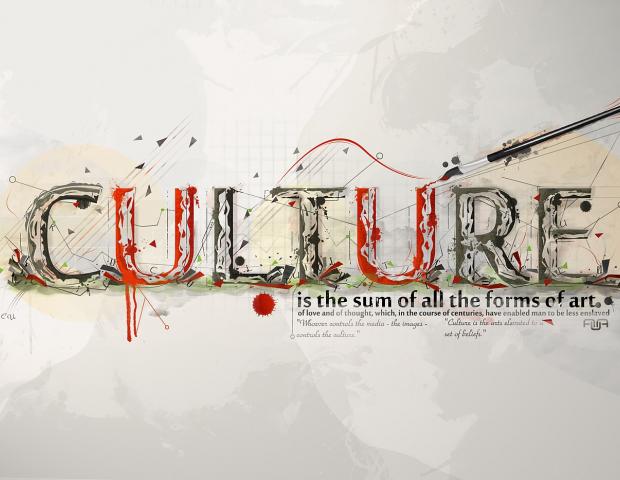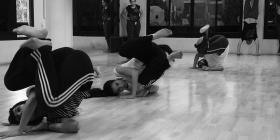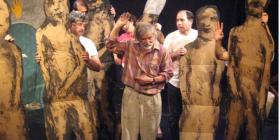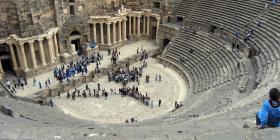THE DEVELOPMENT OF A NATIONAL CULTURAL STRATEGY: A PROCESS, CHALLENGES, A SUCCESS

JORDAN, A CASE-STUDY
On the morning of the 4th July 2017 in Amman, the time had come to add the last finishing touches. The objective of the meeting, which brought together 25 participants, was to finalize the details of a vast national cultural strategy for Jordan and to create an action plan defining the initiatives to be developed as a priority in order to ensure the sustainability of the young national policy.
The project, launched in 2014 by the ‘Med Culture’ programme, did not succeed overnight. It is the result of a long-term effort, established after several stages. The strategy took shape gradually, from the birth of the project to its implementation two years later, with the first founding meeting taking place in May 2016. Over two days, more than one hundred actors in the field of Jordanian culture – representatives of different ministries, civil society, artistic associations, etc. – gathered around a table to discuss the adoption of a common strategy for cultural development at a national level.
In order to establish a fair, concrete and honest picture of the state of culture in Jordan, it was necessary to unite the active cultural actors at various levels of the Jordanian society: officials, semi-officials (such as the royal foundations), freelancers, trade unions, private institutions… and to define the role of each one in the Jordanian cultural scene. The thinking process behind the national strategies had been initiated by the Med Culture programme in different countries in the region, but it was in Jordan that it was the most successful, due to the participants’ involvement in the development of the different ideas. The programme has made it possible to establish a sustainable and independent process. Linda Al Khoury, founder of the photography centre Darat El Tasweer, and a participant of the project, explains: “It wasn’t easy to come up with a common strategy; it required the involvement of many people, organising many meetings and carrying out a lot of research. But finally, following our numerous meetings and determination, the strategy was implemented.”
DEFINING CULTURE ON A NATIONAL SCALE
The photographer continues: “One of the biggest challenges this strategy faces is the substantial difference between Amman, the capital, and the rest of Jordan. The way in which we approach culture varies from one part of Jordan to the next. In the same way, we take a different view of culture depending on whether we work with the civil society or the ministry. That’s why it’s hard to find a strategy that suits everyone.” For before drawing up a national cultural strategy, everyone must agree on a definition of culture on a country-wide scale". In Jordan several questions were raised, such as: should Islam be considered one of the main cultural values of the country? How can we reach an agreement in a country where territorial, religious and ethnic differences are so diverse? The different participants were all agreed on the use of the word ‘culture’ as defined by UNESCO: "Culture, in its broad sense, is considered as the set of distinctive, spiritual and material, intellectual and emotional traits that characterize a society or a social group. It encompasses, in addition to arts and literature, lifestyles, fundamental human rights, value systems, traditions and beliefs.”
To define a cultural strategy, we must also look beyond the borders and draw inspiration from initiatives elsewhere. Some comparison points have been suggested at the regional level. “We mustn’t forget that the governments of Arab countries approach culture differently to European or American governments. Here, in general, governments are culturally promoting the country but don’t focus on culture in and of itself,” adds Linda Al Khoury. At the meeting on 4th July in Amman, two projects were presented to the Jordanian cultural players: “Lebanon 2020”, which aims to review the current state of Lebanese culture by 2020 and proposes recommendations for the implementation of a coherent cultural policy, and Madrassa, a regional program financed by the “Med Culture” program within the framework of Southmed CV, which aims to train and connect a community of young professionals of the arts across different countries of the Southern Mediterranean. Indeed, for Linda Al Khoury, inspiration must also be sought from other countries in the area: "Lebanon, Egypt or even Syria have a wider cultural history than us. Even if they do not necessarily have a national strategy, they are more advanced than we are on this point.”
IDENTIFYING THE CHALLENGES OF SUCH A PROCESS
Even though national strategy projects have emerged in the area, they always correspond to a reality unique to their own country. In Lebanon, for example, the initiators of “Lebanon 2020” could not count on collaboration with the government. “There are no strong institutions like in Jordan,” explains Célia Hassani, deputy director of “Lebanon 2020”. “Here, civil society was working on its own, then tried to involve the government afterwards… And that didn’t work.” In Tunisia, Shiran Ben Abderrazak, manager of Dar Eyqem, who is working on a similar project, alludes to other difficulties: “When we started, just after the Revolution, it was difficult to gather everyone around the same table and discuss constructively. It was necessary for everyone to learn to listen to each other, to their points of view and to recognize that everyone had the same right to be heard in the debate.”
Another problem which cultural strategy promoters were confronted with was the methodology. “We had to find a way of working specific to Lebanon,” explains Célia Hassani. “We work from devices which come from the West and we use English words like “mapping” or “capacity building” which don’t necessarily correspond with the situation here.” Different founders must therefore try to adapt the methodology to fit their own country. For Shiran Ben Abderrazak, this implementation was less difficult: “We relied on a methodology designed for Morocco, a nearby country. However, one difficulty prevails in the region, and is applicable to all countries: that of finding data and statistics.”
CULTURE IN JORDAN: A MEANS TO COMBAT EXTREMISM, DESPITE A FRAGILE FOUNDATION
To define the notion of culture in a country is also to accept its weaknesses. “Culture in Jordan is not yet able to stand on its own two feet”, says Linda Al Khoury. In Jordan, one problem seems central: the absence of research and statistics in the cultural sector. Without documentation or precise data, how can a national strategy be developed? Russol Al-Nasser, in charge of many musical projects in the country and involved in the national cultural strategy, has travelled the country and met its musicians. She hates the fact that Jordanian folklore is in danger. “In many areas, it isn’t documented,” she explains. “With the internet, traditions don’t always pass on to new generations, and little by little they die.” In order to combat this, Russol Al-Nasser offers musical programs which combine traditional folklore and new rhythms. She tries to make them accessible to as many people as possible: “Times are hard and unstable in our area. Music is a good way to fight against this.”
A national cultural strategy can also act as a bulwark against the scourges of war and terrorism. Making culture accessible to as many people as possible is one of the top priorities for the participants, who see this as a way to fight against extremism and marginalization. For Jordan’s government, a player in the national strategy, one of the ways to make these priorities a reality is through the support of civil society organisations, as Dr. Ahmad Rashed, advisor to the Jordanian Minister of Culture, explains. “In a way, these organisations represent arms whose reach makes culture accessible throughout the different regions of the Kingdom, and they have a considerable influence. In this way, these organisations carry a heavy responsibility on their shoulders for the effective development of the country’s cultural sector.”
Now that the main points have been set down on paper, it is time for all involved parties in this national strategy project to take action. We must now move from theory to practise and decide on the courses of action that are most likely to succeed. For this, the actors within the civil society and the different ministries will have to find focal points and work hand in hand.







